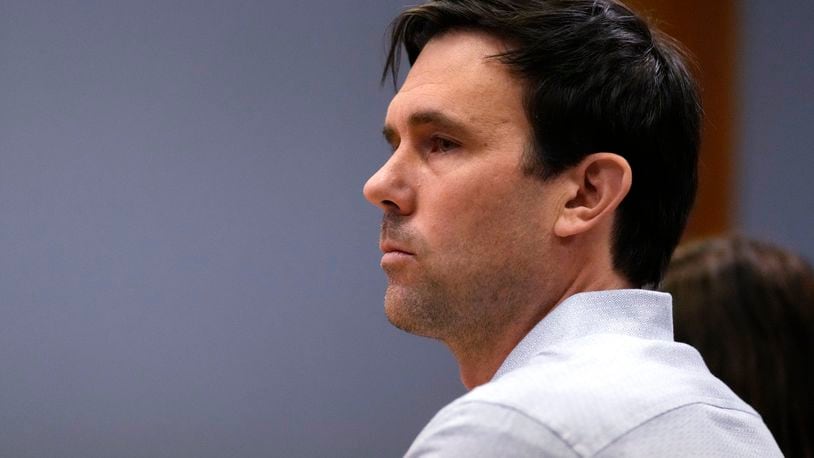He could be released as early as May.
“I think it's unimaginably horrible,” Parker said during the parole hearing when asked by a board member what he thought of what he did. “ I know there's not an amount of time or things that I can do to change it, or alleviate any pain that I've caused.”
When asked what he had to say to family and friends of the victims, he said, “I'm just deeply sorry."
His lawyer and Department of Corrections staff said he has taken many steps through the years to rehabilitate himself and make life better for fellow inmates, and parole board member Ronald Bessette noted he had a “stellar” disciplinary record and has worked with nonprofit groups on art projects.
Parker earned bachelor’s and master’s degrees in prison and created paintings that are displayed in the building. He’s been a part of theatrical, musical and sports activities and has helped develop inmate education guides. He has lived in transitional housing, usually the final placement for a resident prior to their release.
Parker sought a sentence reduction in 2018. Under the law, he was eligible to do so because he had served two-thirds of his term, but he withdrew the petition in 2019 after the Zantops' two daughters objected.
Parker and then-17-year-old Robert Tulloch, bored with their lives in nearby Chelsea, Vermont, wanted to move to Australia and estimated they needed $10,000 for the trip. They eventually decided they would knock on homeowners’ doors under the pretext of conducting a survey on environmental issues, then tie up their victims and steal their credit cards and ATM information. They planned to make their captives provide the pin numbers before killing them.
Parker, who cooperated with prosecutors and agreed to testify against Tulloch, said they picked the Zantop house because it looked expensive and it was surrounded by trees. Half Zantop let them in on Jan. 27, 2001. Parker told police the interview lasted at least 10 minutes When Half Zantop pulled out his wallet, Tulloch stabbed him, then directed Parker to attack Susanne Zantop. Tulloch also stabbed her.
“When his wife came in, I restrained her, and then,” Parker said Thursday in a low voice, pausing. “I cut her throat. She fell to the floor.”
“Why did you do that?” Bessette asked.
Parker shook his head. “It's just so hard. I've gone over and over it and just finding an explanation for that is just, I just don't know how I could do that.”
“Put yourself back to 2001,” Bessette said.
Parker said “We were attempting to get money to go overseas and live some sort of life of adventure,” admitting he and Tulloch planned to rob and kill people.
They fled with Half Zantop’s wallet, which contained about $340 and a list of numbers, but then realized they had left sheaths to their knives at the house. They attempted to go back but saw a police officer was in the driveway. Fingerprints on a knife sheath and a bloody boot print linked them to the crime, but after being questioned by police, they fled and hitchhiked west. They were arrested at an Indiana truck stop weeks later.
Tulloch, now 40, had pleaded guilty to first-degree murder. He got the mandatory sentence of life without parole. He is scheduled for a resentencing hearing in June. The U.S. Supreme Court had ruled in 2012 that it is unconstitutional to sentence juvenile offenders to mandatory life imprisonment without parole, and the state Supreme Court ruled in 2014 that Tulloch and four other men who received such sentences for murders they committed as teenagers should be re-sentenced.
Bessette asked Parker how he could tell the community they “don't have to lock our doors” and that he does not pose a threat.
“I'm going to continue living my life the way I lived it in the prison and during this transition,” Parker said. “It's become very important to me to stay connected to family and friends. I look to them for support and advice all the time. And I'll just keep being the man I've been trying to become — trying to become a better man than when I was that kid."
Under his parole conditions, Parker cannot have contact with the Zantop family and he will continue to engage in mental health treatment.
Susanne Zantop, 55 and Half Zantop, 62, were born in Germany. She was head of Dartmouth’s German studies department. He taught Earth sciences. Respected in their fields, the professors were beloved by colleagues and students, many of whom had an open invitation to their home a few miles from the Dartmouth campus.
There were nine people described as family and supporters of Parker's at the parole hearing. They did not speak and one woman cried after the board made their decision.
“This is a hard one to make a statement about, especially because I can’t speak for everyone affected by what happened,” Veronika Zantop, one of the Zantops’ two daughters, said in an email to The Associated Press. "For me — I miss my parents and am deeply sad for everything they — and we — have missed out on. I miss my father’s sense of humor and kindness and my mother’s sharp wit and tenacity in all things. Among so many other things. I am deeply grateful for all of the support we have received.
“I wish James Parker and his family the best and hope that they can heal.”
Credit: AP
Credit: AP
Credit: AP
Credit: AP
Credit: AP
Credit: AP
Credit: AP
Credit: AP
Credit: AP
Credit: AP
Credit: AP
Credit: AP
Credit: AP
Credit: AP
Credit: AP
Credit: AP
Credit: AP
Credit: AP
